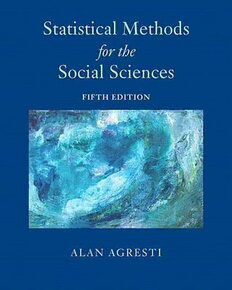
Statistical methods for the social sciences PDF
Preview Statistical methods for the social sciences
GLOBAL EDITION Statistical Methods for the Social Sciences FIFTH EDITION ALAN AGRESTI S M TATISTICAL ETHODS FOR S S THE OCIAL CIENCES Fifth Edition Global Edition Alan Agresti University of Florida Harlow, England • London • New York • Boston • San Francisco • Toronto • Sydney • Dubai • Singapore • Hong Kong Tokyo • Seoul • Taipei • New Delhi • Cape Town • São Paulo • Mexico City • Madrid • Amsterdam • Munich • Paris • Milan Director,PortfolioManagement:DeirdreLynch SeniorPortfolioManager:SuzannaBainbridge PortfolioManagementAssistant:JustinBilling ContentProducer:SherryBerg ManagingProducer:KarenWernholm Producer:JeanChoe Manager,CoursewareQA:MaryDurnwald Manager,ContentDevelopment:BobCarroll SeniorAcquisitionsEditor,GlobalEdition:SandhyaGhoshal Editor,GlobalEdition:PunitaKaurMann ContentProducer,GlobalEdition:IshaSachdeva ProductMarketingManager:YvonneVannatta FieldMarketingManager:EvanSt.Cyr ProductMarketingAssistant:JenniferMyers FieldMarketingAssistant:ErinRush SeniorAuthorSupport/TechnologySpecialist:JoeVetere Manager,RightsandPermissions:GinaCheselka ManufacturingBuyer:CarolMelville,LSCCommunications SeniorManufacturingController,GlobalEdition:KayHolman AssociateDirectorofDesign:BlairBrown ProductionCoordination,Composition,andIllustrations:iEnergizerAptara(cid:2)R,Ltd. CoverImage:MarinaZakharova/Shutterstock Attributionsofthirdpartycontentappearonpage549,whichconstitutesanextensionof thiscopyrightpage. PearsonEducationLimited KAOTwo KAOPark Harlow CM179NA UnitedKingdom andAssociatedCompaniesthroughouttheworld VisitusontheWorldWideWebat: www.pearsonglobaleditions.com (cid:2)c PearsonEducationLimited2018 TherightsofAlanAgrestitobeidentifiedastheauthorofthisworkhavebeenassertedby himinaccordancewiththeCopyright,DesignsandPatentsAct1988. AuthorizedadaptationfromtheUnitedStatesedition,entitledStatisticalMethodsforthe SocialSciences,5thEdition,ISBN978-0-13-450710-1byAlanAgresti,publishedbyPearson Education(cid:2)c 2018. Allrightsreserved.Nopartofthispublicationmaybereproduced,storedinaretrieval system,ortransmittedinanyformorbyanymeans,electronic,mechanical,photocopying, recordingorotherwise,withouteitherthepriorwrittenpermissionofthepublisherora licensepermittingrestrictedcopyingintheUnitedKingdomissuedbytheCopyright LicensingAgencyLtd,SaffronHouse,6–10KirbyStreet,LondonEC1N8TS. Alltrademarksusedhereinarethepropertyoftheirrespectiveowners.Theuseofany trademarkinthistextdoesnotvestintheauthororpublisheranytrademarkownership rightsinsuchtrademarks,nordoestheuseofsuchtrademarksimplyanyaffiliationwithor endorsementofthisbookbysuchowners. BritishLibraryCataloguing-in-PublicationData AcataloguerecordforthisbookisavailablefromtheBritishLibrary Typesetin10/12TimesTenLTStd-RomanbyiEnergizerAptara(cid:2)R,Ltd. ISBN10: 1-292-22031-7 PrintedandboundbyVivarinMalaysia ISBN13:978-1-29-222031-4 TO MY PARENTS LOUIS J. AGRESTI AND MARJORIE H. AGRESTI This page intentionally left blank Contents Preface 9 4.4 SamplingDistributionsDescribeHow StatisticsVary 92 Acknowledgments 11 4.5 SamplingDistributionsofSampleMeans 97 4.6 Review:Population,SampleData,and 1 Introduction 13 SamplingDistributions 103 4.7 ChapterSummary 106 1.1 IntroductiontoStatisticalMethodology 13 5 1.2 DescriptiveStatisticsandInferential Statistical Inference: Statistics 16 Estimation 115 1.3 TheRoleofComputersandSoftwarein Statistics 18 5.1 PointandIntervalEstimation 115 1.4 ChapterSummary 20 5.2 ConfidenceIntervalforaProportion 118 2 5.3 ConfidenceIntervalforaMean 125 Sampling and Measurement 23 5.4 ChoiceofSampleSize 132 2.1 VariablesandTheirMeasurement 23 5.5 EstimationMethods:MaximumLikelihood andtheBootstrap∗ 138 2.2 Randomization 26 5.6 ChapterSummary 142 2.3 SamplingVariabilityandPotentialBias 29 2.4 OtherProbabilitySamplingMethods∗ 33 6 Statistical Inference: 2.5 ChapterSummary 35 Significance Tests 151 3 Descriptive Statistics 41 6.1 TheFivePartsofaSignificanceTest 152 6.2 SignificanceTestforaMean 155 3.1 DescribingDatawithTablesandGraphs 41 6.3 SignificanceTestforaProportion 164 3.2 DescribingtheCenteroftheData 47 6.4 DecisionsandTypesofErrorsinTests 167 3.3 DescribingVariabilityoftheData 53 6.5 LimitationsofSignificanceTests 171 3.4 MeasuresofPosition 58 6.6 FindingP(TypeIIError)∗ 175 3.5 BivariateDescriptiveStatistics 63 6.7 Small-SampleTestforaProportion—the 3.6 SampleStatisticsandPopulation BinomialDistribution∗ 177 Parameters 67 6.8 ChapterSummary 181 3.7 ChapterSummary 67 7 Comparison of Two Groups 191 4 Probability Distributions 79 7.1 PreliminariesforComparingGroups 191 4.1 IntroductiontoProbability 79 7.2 CategoricalData:ComparingTwo 4.2 ProbabilityDistributionsforDiscreteand Proportions 194 ContinuousVariables 81 7.3 QuantitativeData:Comparing 4.3 TheNormalProbabilityDistribution 84 TwoMeans 199 5 6 Contents 7.4 ComparingMeanswithDependent 11 Multiple Regression Samples 202 and Correlation 319 7.5 OtherMethodsforComparingMeans∗ 205 7.6 OtherMethodsforComparing 11.1 TheMultipleRegressionModel 319 Proportions∗ 210 11.2 MultipleCorrelationandR2 328 7.7 NonparametricStatisticsfor ComparingGroups∗ 213 11.3 InferencesforMultipleRegression Coefficients 332 7.8 ChapterSummary 216 11.4 ModelingInteractionEffects 337 8 11.5 ComparingRegressionModels 341 Analyzing Association between Categorical Variables 227 11.6 PartialCorrelation∗ 343 11.7 StandardizedRegression 8.1 ContingencyTables 227 Coefficients∗ 346 8.2 Chi-SquaredTestofIndependence 230 11.8 ChapterSummary 349 8.3 Residuals:DetectingthePatternof Association 237 12 Regression with Categorical 8.4 MeasuringAssociationinContingency Predictors: Analysis of Tables 239 Variance Methods 363 8.5 AssociationBetweenOrdinalVariables∗ 245 8.6 ChapterSummary 250 12.1 RegressionModelingwithDummyVariables forCategories 363 9 Linear Regression 12.2 MultipleComparisonsofMeans 367 and Correlation 259 12.3 ComparingSeveralMeans:Analysisof Variance 370 9.1 LinearRelationships 259 12.4 Two-WayANOVAandRegression 9.2 LeastSquaresPredictionEquation 262 Modeling 374 9.3 TheLinearRegressionModel 268 12.5 Repeated-MeasuresAnalysisof Variance∗ 381 9.4 MeasuringLinearAssociation: TheCorrelation 271 12.6 Two-WayANOVAwithRepeatedMeasures onaFactor∗ 385 9.5 InferencesfortheSlopeand Correlation 278 12.7 ChapterSummary 390 9.6 ModelAssumptionsandViolations 284 13 9.7 ChapterSummary 289 Multiple Regression with Quantitative and Categorical 10 Introduction to Multivariate Predictors 399 Relationships 299 13.1 ModelswithQuantitativeandCategorical 10.1 AssociationandCausality 299 ExplanatoryVariables 399 10.2 ControllingforOtherVariables 302 13.2 InferenceforRegressionwith QuantitativeandCategorical 10.3 TypesofMultivariateRelationships 306 Predictors 406 10.4 InferentialIssuesinStatisticalControl 311 13.3 CaseStudies:UsingMultipleRegression 10.5 ChapterSummary 313 inResearch 409 Contents 7 13.4 AdjustedMeans∗ 413 15.3 InferenceforLogisticRegression 13.5 TheLinearMixedModel∗ 418 Models 482 15.4 LogisticRegressionModelsforOrdinal 13.6 ChapterSummary 423 Variables∗ 484 14 15.5 LogisticModelsforNominal Model Building with Multiple Responses∗ 489 Regression 431 15.6 LoglinearModelsforCategorical Variables∗ 492 14.1 ModelSelectionProcedures 431 15.7 ModelGoodness-of-FitTestsfor 14.2 RegressionDiagnostics 438 ContingencyTables∗ 496 14.3 EffectsofMulticollinearity 445 15.8 ChapterSummary 500 14.4 GeneralizedLinearModels 447 14.5 NonlinearRelationships:Polynomial Appendix: R, Stata, SPSS, and SAS Regression 451 for Statistical Analyses 509 14.6 ExponentialRegressionandLog Transforms∗ 456 Bibliography 545 14.7 RobustVariancesandNonparametric Regression∗ 460 Credits 14.8 ChapterSummary 462 549 15 Logistic Regression: Modeling Index 551 Categorical Responses 471 15.1 LogisticRegression 471 15.2 MultipleLogisticRegression 477 This page intentionally left blank Preface When Barbara Finlay and I undertook the first edition of this book nearly four decadesago,ourgoalwastointroducestatisticalmethodsinastylethatemphasized their concepts and their application to the social sciences rather than the mathe- maticsandcomputationaldetailsbehindthem.Wedidthisbyfocusingonhowthe methodsareusedandinterpretedratherthantheirtheoreticalderivations. Thiseditionof thebook continues theemphasis onconcepts andapplications, usingexamplesandexerciseswithavarietyof“realdata.”Thiseditionincreasesits illustrationsofstatisticalsoftwareforcomputations,andtakesadvantageoftheout- standingappletsnowavailableontheInternetforexplainingkeyconceptssuchas samplingdistributionsandforconductingbasicdataanalyses.Icontinuetodownplay mathematics,inparticularprobability,whichisalltoooftenastumblingblockforstu- dents.Ontheotherhand,thetextisnotacookbook.Relianceonanoverlysimplistic recipe-basedapproachtostatisticsisnottheroutetogoodstatisticalpractice. Changes in the Fifth Edition UsersofearliereditionswillnoticethatthebooknolongerlistsBarbaraFinlayas a co-author. I am grateful to Barbara Finlay for her contributions to the first two editions of this text. Combining her sociology background with my statistics back- ground,sheverymuchhelpedmedevelopabookthatisnotonlystatisticallysound butalsorelevanttothesocialsciences. Sincethefirstedition,theincreaseincomputerpowercoupledwiththecontin- uedimprovementandaccessibilityofstatisticalsoftwarehashadamajorimpacton thewaysocialscientistsanalyzedata.Becauseofthis,thisbookdoesnotcoverthe traditionalshortcuthand-computationalformulasandapproximations.Thepresen- tationofcomputationallycomplexmethods,suchasregression,emphasizesinterpre- tationofsoftwareoutputratherthantheformulasforperformingtheanalysis.The textcontainsnumeroussamplesoftwareoutputs,bothinchaptertextandinhome- workexercises.Intheappendixonusingstatisticalsoftware,thiseditionaddsRand StatatothematerialonSPSSandSAS. Exposuretorealisticbutsimpleexamplesandtonumeroushomeworkexercises is vital to student learning. This edition has updated data in most of the exercises andreplacedsomeexerciseswithnewones.Eachchapter’shomeworksetisdivided intotwoparts,straightforwardexercisesonthetextmaterialinPracticingtheBasics andexercisesdealingwithopen-endeddataanalyses,understandingofconcepts,and advancedmaterialinConceptsandApplications.Thedatasetsintheexamplesand exercisesareavailableatwww.pearsonglobaleditions.com/Agresti. Thiseditioncontainssomechangesandadditionsincontent,directedtowarda moremodernapproach.Themainchangesareasfollows: • Thetexthasgreaterintegrationofstatisticalsoftware.Softwareoutputshown nowusesRandStatainsteadofonlySASandSPSS,althoughmuchoutputhas agenericappearance.Thetextappendixprovidesinstructionsaboutbasicuse ofthesesoftwarepackages. • New examples and exercises in Chapters 4–6 ask students to use applets to help learn the fundamental concepts of sampling distributions, confidence 9
